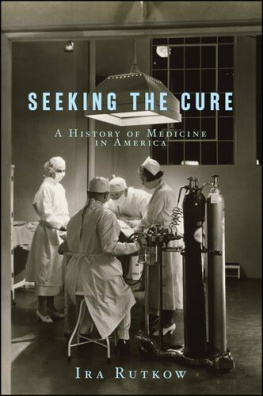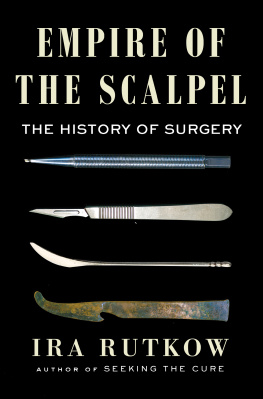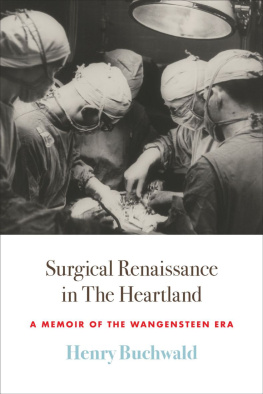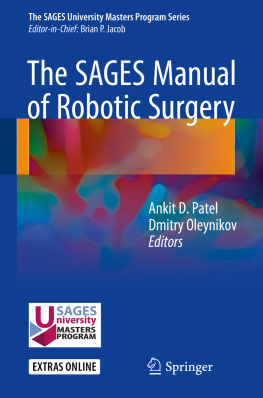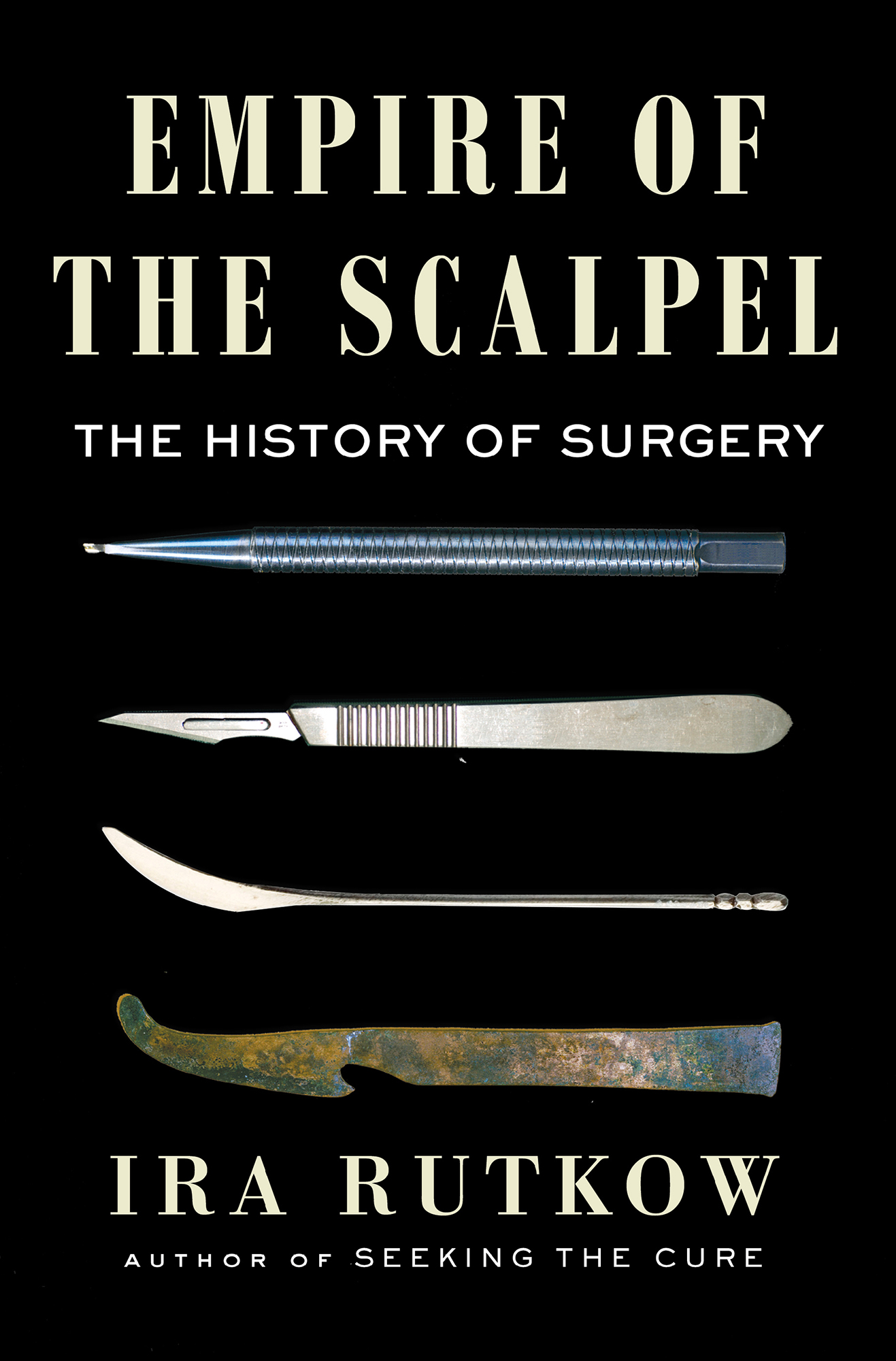Contents
Guide
Empire of the Scalpel
The History of Surgery
Ira Rutkow
Author of Seeking the Cure
ALSO BY IRA RUTKOW
Seeking the Cure: A History of Medicine in America
James A. Garfield
Bleeding Blue and Gray: Civil War Surgery and the Evolution of American Medicine
Surgery: An Illustrated History
American Surgery: An Illustrated History
The History of Surgery in the United States 17751900: Volume II, Periodicals & Pamphlets
The History of Surgery in the United States, 17751900: Volume I, Textbooks, Monographs & Treatises

Scribner
An Imprint of Simon & Schuster, Inc.
1230 Avenue of the Americas
New York, NY 10020
www.SimonandSchuster.com
Copyright 2022 by Ira Rutkow
Excerpt from Negro Hero by Gwendolyn Brooks. Reprinted by consent of Brooks Permissions.
All rights reserved, including the right to reproduce this book or portions thereof in any form whatsoever. For information, address Scribner Subsidiary Rights Department, 1230 Avenue of the Americas, New York, NY 10020.
First Scribner hardcover edition March 2022
SCRIBNER and design are registered trademarks of The Gale Group, Inc., used under license by Simon & Schuster, Inc., the publisher of this work.
For information about special discounts for bulk purchases, please contact Simon & Schuster Special Sales at 1-866-506-1949 or .
The Simon & Schuster Speakers Bureau can bring authors to your live event. For more information or to book an event, contact the Simon & Schuster Speakers Bureau at 1-866-248-3049 or visit our website at www.simonspeakers.com.
Interior design by Wendy Blum
Cover design by Jaya Miceli
Cover photographs: Top, Lower Middle, and Bottom by Science & Society Picture Library/Getty Images; Upper Middle by Universalimagesgroup/Getty Images
Library of Congress Cataloging-in-Publication Data
Names: Rutkow, Ira M., author. Title: Empire of the scalpel : the history of surgery / Ira Rutkow. Description: First edition. | New York : Scribner, 2022. | Includes bibliographical references and index. Identifiers: LCCN 2021048634 (print) | LCCN 2021048635 (ebook) | ISBN 9781501163746 (hardcover) | ISBN 9781501163760 (ebook) Subjects: LCSH: SurgeryHistory. Classification: LCC RD19 .L33 2022 (print) | LCC RD19 (ebook) | DDC 617dc23/eng/20211104
LC record available at https://lccn.loc.gov/2021048634
LC ebook record available at https://lccn.loc.gov/2021048635
ISBN 978-1-5011-6374-6
ISBN 978-1-5011-6376-0 (ebook)
For Alex and Benjamin, two AGs.
May your futures be filled with happiness, health, love, and success
AUTHORS NOTE
Why is the amphitheater crowded to the roof, by adepts as well as students, on the occasion of some great operation, while the silent working of some well-directed drug excites comparatively little comment? Mark the hushed breath, the fearful intensity of silence, when the blade pierces the tissues, and the blood of the unhappy sufferer wells up to the surface. Animal sense is always fascinated by the presence of animal suffering.
Henry J. Bigelow, An Introductory Lecture, delivered at the Massachusetts Medical College, 1849
Surgeons must be very careful
When they take the knife!
Underneath their fine incisions
Stirs the Culprit, Life!
Emily Dickinson, Poems, 2nd series, 1891
This book is about the history of surgery and examines the relationship between my profession and society. The clearest indication of modern surgerys impact on our lives is the reasonable certainty that virtually no one in the industrialized world will escape having an illness for which effective treatment requires a surgical operation. This extraordinary fact is supported by a recent World Health Organization report that estimates the global number of surgical procedures at hundreds of millions per year; in America alone, tens of millions are performed annually. Indeed, a case can be made that many aspects of modern surgery, such as breast augmentations, cataract removals, gender reassignment operations, heart transplants, hip and knee replacements, and procedures for obesity, have become mainstream cultural benchmarks. That few of us pause to think about the magnitude of these statistics, that we have such inherent faith in this mystifying branch of the medical world, is nothing short of remarkable.
There is no denying that the rise of surgery and confidence in its practitioners is among the most profound of changes that separate current existence from past eras. Yet, despite the debates, the headlines, and the table talk that surround surgical operations, most of us have no idea how surgeons arrived where they are or of the ins and outs of what they do. None of this is surprising, because surgerys inner sanctum is closely guarded. After all, surgery began as a quasi-religious, supernatural craft, as intriguingly admired as it was singularly feared (it still is in many cultures); there are not many events in life that are as simultaneously life frightening and lifesaving as a surgical procedure.
Few would disagree that surgery is concealed from the world by its jargon and rituals. For instance, to simply enter an operating room necessitates an act of supplication to the surgical gods. Surgeons must first put on a cap and mask to separate themselves from the outside world. If the patient is to be closely approached, then an anointing wash of antiseptic soap and cleansing water followed by the sliding on of sterile rubber gloves and the donning of a germ-free gown (the surgeons priestly robe?) are required to further isolate and purify the encounter. Nonphysicians seeking entry into this mysterious realm and its secrecies are usually met by locked doors.
Empire of the Scalpel addresses this glaring silence and tells surgerys story; from its subjective Stone Age origins to its objective roots in the classical world of Europe and finally its rise to scientific and social supremacy in the United States. No other approach captures the growth of surgery in all its dramatic and gory complexity. I devote attention to European surgery because its evolution, from Greek and Roman Antiquity to the rise of barber-surgeons in the Middle Ages, followed by the emergence of centers of surgical excellence in England and France during the seventeenth and eighteenth centuries, and concluding with Germanys predominance at the end of the nineteenth and beginning of the twentieth centuries, developed in ways that served as the wellspring of modern surgery.
European surgerys dominance arose from the technical expertise of its practitioners, the credibility of their professional organizations, and the perception that surgical therapies worked well. Its status as the international leader in surgery ended with the First World War. The conflict destroyed much of the Continentif not its physical features, then a large measure of its finances and passion for scholarly and scientific pursuits. The result was a global vacuum in surgical education, research, training, and therapeutics. It was only natural for surgeons from the United States, the industrialized nation least affected physically and psychologically by the war, to fill the void.

